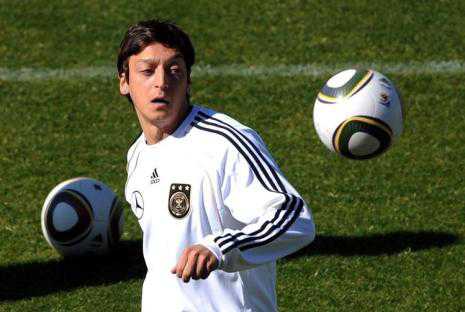When the camera pans along the German team on Sunday, and that famous national anthem thunders out across the Durban stadium, Mesut Özil’s lips will be moving but he won’t be singing along.

No, Özil will be reciting the Koran to himself. “It gives me strength,” he has explained. “If I don’t do it before a game it gives me a bad feeling.”
Özil is at the vanguard of a new Germany. This is not the Mannschaft of Teutonic cliché, it is the most ethnically diverse squad in the tournament. Of the 23, 11 were eligible to play for a different country.
While there have been several Polish-Germans of Silesian background to have played for Germany (including Miroslav Klose and Lukas Podolski in this squad), Joachim Löw’s team also has players of Bosnian-Serb, Brazilian, Ghanaian, Nigerian, Polish, Tunisian and Turkish descent.
This new German team has been many years in the making. Hosting the last World Cup catalysed a reassessment of what it means to be a modern German.
The success of Jürgen Klinsmann’s side at the tournament united the country and gave birth to a patriotism that was not weighed down by the baggage of history.
The national flag, with all its dubious nationalist association, was suddenly an object of pride and, to the astonishment of many, was even hung from the windows of houses in the German-Turkish community.
Germany was changing and so was its football team. Between 1995 and 2004, 1,278,424 foreigners took German citizenship and the laws regarding eligibility were liberalised in 1999 through major reforms.
The new face of German was represented in the football team, with black players of African background like Gerald Asamoah, David Odonkor and Patrick Owomoyela winning caps.
The latter was the subject of a predictable right-wing backlash when he was included in the squad for the World Cup four years ago.
The right-wing NPD (the equivalent of the BNP) produced a calendar with a picture of the national shirt with Owomoyela’s squad number on it and the slogan: “White: not just the colour of the shirt! For a real National team!” The leader of the party was taken to court by Owomoyela and the German FA and found guilty of inciting racial hatred and given a seven-month suspended sentence.
Four years on and there remain mumblings of nationalist discontent about whether this team represents the ‘real’ Germany. Most Germans are relaxed about the singing of the national anthem but the Bild newspaper has tried to force it as an issue. Klose and Podolski have always refused to sing it and several of the new generation joined them.
And then there is Özil with his Koranic incantation. When Franz Beckenbauer was manager he demanded all his players sang the anthem – and this year he’s at it again. Times have changed.
Özil is a fascinating case. With the injury to Michael Ballack, German fans have been looking to a new inspiration for the team and the Werder Bremen playmaker has stepped up. He is tremendously skilful and unpredictable and is arguably the most exciting young player at the finals.
That he has even chosen to represent Germany could have resonance for the future of the Turkish-German community, especially if he leads them to success here. In a 2007 survey it was estimated that there were 1.7 million people living in Germany of Turkish descent, by far the largest ethnic minority in the country. Yet Turkish-Germans, like the Altintop brothers, often opted to play for the country of their parents.
Özil is different. He is a third-generation immigrant who feels himself a blend of both cultures. He grew up playing with other immigrant children, from Bosnia, Lebanon and Turkey, in Gelsenkirchen- Bismarck, and rapidly emerged as an exceptional talent. “My technique and feeling for the ball is the Turkish side to my game,” he said, “the discipline, attitude and always-give- your-all is the German part.”
At the European Under-21 Championships last summer, Özil destroyed England in the final, making two and scoring a free-kick as Germany won 4-0. In that same squad were Dennis Aogo, Sami Khedira and Jerome Boateng, sons of Nigerian, Tunisian and Ghanian fathers respectively. Marko Marin, a Bosnian-Serb whose family moved to Germany when he was two, was also in that group. All four have been promoted to what is Germany’s youngest squad at a World Cup.
Boateng is the only player to play abroad, and he only signed for Manchester City last weekend for £10 million. He is the brother of Kevin-Prince, the Portsmouth forward. Both played for Germany at every youth level but last year Kevin-Prince declared for Ghana and they will be in opposition in the final group game on Wednesday week. It tells you everything you need to know about the mobility of international football that brothers can be in opposition at a World Cup.
That mobility is also evident with Cacau. The Stuttgart striker is favourite to start ahead of Bayern Munich’s Miroslav Klose against Australia after some strong performances in the warm-up friendlies. He qualified for German citizenship after five years of residency and, like Marcos Senna with Spain and Eduardo of Croatia, has opted to represent his adopted country. He could be one of the surprises of this tournament.
With a Brazilian-Polish strike partnership (Cacau-Podolski) , a Turkish playmaker (Özil), a Tunisian holding midfielder (Khedira), a Bosnian-Serb winger (Marin), Nigerian and Ghanaian full backs (Aogo and Boateng), and an elegant Turkish centre-back (Serdar Tasci), you can throw out all the old stereotypes about German football when they play Australia. This is a new Germany, and in South Africa, a country itself profoundly marked by racial division, they want to show that they are the future.
Source : Daily Telegraph
by Duncan White





